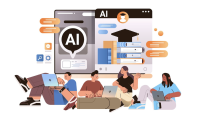Search
There are 13 results.
Tag
Tag
All (70)
Active Learning (2)
Activities (1)
Alt Text (1)
Assessments (8)
Authentic Activities (3)
Belonging (3)
Canvas (2)
Case Studies (2)
Collaboration (2)
Color Contrast (1)
Communication (4)
Community (3)
Competency-Based Education (3)
Content Creation (15)
Course Materials (10)
Course Preparation (3)
Discussions (2)
Diversity (5)
Equity (2)
Faculty Support (2)
Feedback (9)
Formative Assessments (9)
Game-Based Learning (1)
Generative AI (5)
Grading (8)
Group Work (2)
Images (1)
Inclusion (8)
Learning Objectives (2)
Multimodality (2)
Page Design (1)
Peer Review (1)
PowerPoint (1)
Presentations (1)
Representation (2)
Rubrics (3)
Scaffolding (1)
Screen Readers (1)
Summative Assessments (1)
Third-Party Tools (1)
Universal Design for Learning (UDL) (3)
Video (1)
Visual Accessibility (2)
Workload (1)
Written Assignments (1)
Presentation Best Practices Guide
Many online courses focus on written communication skills, featuring discussion posts, papers, and case study reports among other assignments. However, oral communication and presentation skills are just as integral to students’ success, and, indeed, many employers list presenting as one of the most desirable skills for job candidates (Suhadi et al., 2021).
Inclusive Communication Practices
In asynchronous, hybrid, and multimodal learning environments, strong communication practices greatly aid student engagement and satisfaction (Martin & Bolliger, 2018). Faculty may develop an exceptional course in terms of goals, content, and design, but without proper communication and feedback, the course experience will be significantly diminished.
Inclusive Language
Inclusion entails creating an environment of open participation for all individuals. Using inclusive language across course content and communications can help reach every learner and ensure all students feel heard, valued, and validated (Márquez & Melero-Aguilar, 2022). This piece will explore the thoughtful use of inclusive language in online learning environments.
Canvas Grading and Feedback: What Students See
Did you know that some forms of assignment feedback in Canvas are more obvious to students than others? Canvas has a Student View option for instructors to get a sense of what students are seeing in most general areas of their courses, but it can be challenging to determine what your actual students are experiencing when accessing your comments on their work or the rubric you’ve filled out for their submission.
Integrating AI Into Assessments: From Policy to Practice
Conventional assessments, such as essays and multiple-choice questions, have long been the cornerstone of evaluating student performance. However, the widespread availability of generative AI (genAI) tools necessitates rethinking assessment methods. Now that genAI tools are readily accessible and rapidly improving, it is crucial to develop assessment approaches that maintain academic integrity while leveraging the benefits of AI to engage students and prepare them for the modern workforce (Yu, 2023).
Fostering Deep Learning and Motivation in the AI Era
As generative artificial intelligence (genAI) reshapes the educational landscape, faculty must rethink traditional assessment strategies to maintain academic integrity and real-world relevance. This piece explores strategies for creating effective assessments in an AI-mediated world, focusing on two key areas: collaborative activities that develop essential human skills, and formative assessments that emphasize personal growth and deep learning. These approaches not only address concerns about AI misuse but also prepare students for future workplaces where human capabilities will complement AI tools.
Project-Based Learning
Project-based learning is learning that is organized around a project (Bell, 2010). It is a student-centered approach to learning, where students choose their topic of study and design an integrative project around the topic (Bell, 2010; Astawa et al., 2017). This form of study promotes self-efficacy in the learning environment. Such self-efficacy enables students to perform more difficult tasks and develop confidence in their abilities (Shin, 2018). These abilities generally help students to transfer their skills to the real world.
The Need to Rethink Assessments in the Age of Generative AI
The rapid advancement of generative artificial intelligence (genAI) technologies has sent shockwaves through the education sector, sparking intense debates about academic integrity, assessment practices, and student learning (Roe et al., 2023; Rudolph et al., 2023; Susnjak & McIntosh, 2024; Swiecki et al., 2022; Yeo, 2023). Since the public release of ChatGPT in November 2022, educators have grappled with concerns about cheating and the potential erosion of traditional academic values (Gorichanaz, 2023; Sullivan et al., 2023). However, as our understanding of genAI capabilities evolves, so too must our approach to assessment and teaching (Lodge et al., 2023).
Beyond Traditional Grades: Alternative Assessment Methods
As educators navigate the challenges and opportunities presented by generative AI (genAI), many are reconsidering traditional assessment approaches. Alternative assessment methods offer innovative ways to evaluate student learning that go beyond conventional grading systems, focusing on authentic learning, skill development, and meaningful engagement. These approaches not only address the challenges posed by AI but also align with research on effective learning and motivation (Furze, 2023; Pitts Donahoe, 2023).
Quiz Writing Best Practices
Quizzes are one of the most common forms of assessment. Instructors can use quizzes to not only test students but also check on their students’ progress throughout a course. When used effectively, quizzes can assess students in a variety of ways. This piece will provide recommendations and best practices for enhancing the quality of quiz content.










